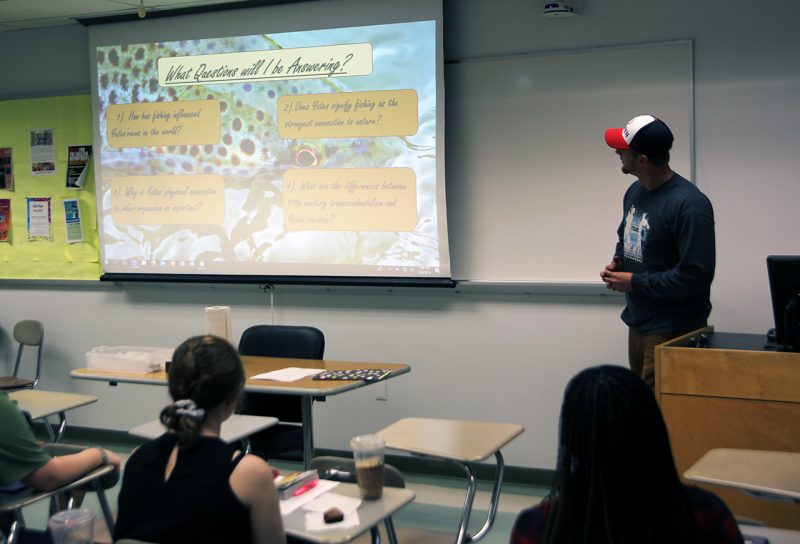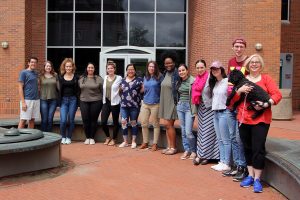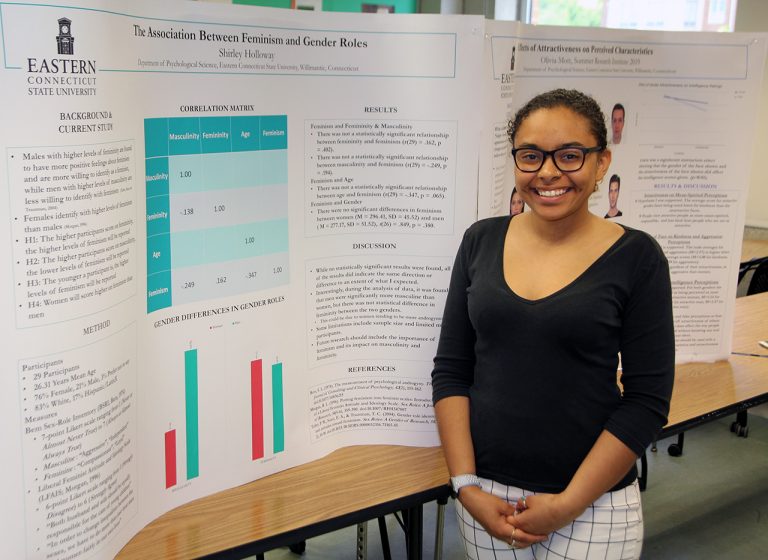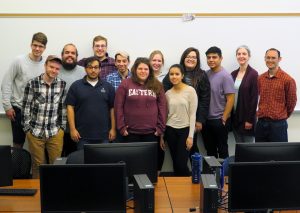- Apply
- Visit
- Request Info
- Give
Research Institutes Help Young Students to Identify as Scholars
Written by Michael Rouleau
Published on June 06, 2019

David Porter ’20 presents “Overlooking How to Fish: How Chris Yates’ Contributions to Modern Day Transcendentalism Have Yet to be Recognized” in the English SRI.
Summer vacation was delayed for four groups of Eastern students who immediately followed the end of the school year with intensive, weeklong research programs on campus. From May 20–24, four Summer Research Institutes (SRIs) engaged select, up-and-coming students in projects pertaining to the fields of psychology, English, political science and network science.
Speaking to the goal of the SRIs, Political Science Professor Courtney Broscious said, “We want to engage students earlier in their academic careers. We want to immerse them in applied research at a younger age and help them to think of themselves as scholars.”

Political science SRI students and faculty pose for a group photo outside of Webb Hall.
Led by Broscious and Political Science Professor Nicole Krassas, the political science SRI challenged first- and second-year students to develop research proposals for projects they will carry out during the academic year. Using applied research methods, the students determined individual topics of inquiry, conducted preliminary research and wrote proposals.
Sophomore Griffin Cox’s research proposal concerns the campaign rhetoric of the 2016 presidential election and how President Trump’s language compares to that of former Presidents Regan and Nixon. “How does he compare to previous galvanizing figures in conservative politics?” questioned Cox.
Sophomore Luc Poirier’s proposal concerns male participation in, and identification with, the feminist movement. “I believe the issue with gaining the support of men in the feminist movement is in part rooted in the word ‘feminist’ itself,” said Poirier. “The term is synonymous with ‘feminine,’ which doesn’t appeal to the ‘macho culture’ that is still alive today.”
The Psychology Department hosted a SRI for 10 students who conducted psychological research on topics related to prejudice, discrimination and stereotypes. Led by Professors Alita Cousins and Jennifer Leszczynski, the students’ inquiry covered such topics as gender and criminality, the effects of physical attractiveness on perceived characteristics, parenting influences on gender and more.

Shirley Holloway ’21 presents “The Association Between Feminism and Gender Roles” at the psychology SRI.
Freshman Sierra Nastasi’s project on gender stereotypes in sports was inspired by her experience as a female hockey player. She said: “Playing on both men’s and women’s teams, I’ve noticed how perceptions of female hockey players differ from those of their male counterparts. I’ve always wanted to learn more about the perceptions that arise in cross-gendered sports.”
The English Department brought together 10 first-year and transfer students for a SRI titled “Finding your Scholarly Voice,” which focused on developing scholarly projects on texts of students’ choice.
“The workshop aimed to help students dive into the scholarly conversation surrounding their texts and find their own ways to contribute to that conversation,” said Professor Allison Speicher, who led the workshop. “Students completed extensive research, synthesizing a wide variety of sources, including literary scholarship, histories, authors’ journals and letters, book reviews and theoretical perspectives, to craft project plans and abstracts for their own scholarly articles.”

Network science SRI students and faculty pose for a group photo.
Freshman Bailey Hosko’s project investigated the minor role of the teacher in the book “Push” by the author Sapphire. The teacher was a “change agent” for the main character, an illiterate 16-year-old girl from Harlem. “The research institute gave me a head start on my senior seminar, but more importantly it gave me a desire to further investigate a topic that I’m interested in as a career,” said Hosko, who aspires for a career as an educator with a focus on literacy.
Mathematics Professor Megan Heenehan and Computer Science Professor Garrett Dancik collaborated on a SRI that introduced students to the field of network science. The week-long program utilized techniques in graph theory, computer programming and network analysis to collected data from movie scripts. Broken into groups, the students used the information to analyze the social structure and sentiment of “Mean Girls, “The Dark Knight” and “Batman and Robin.”


